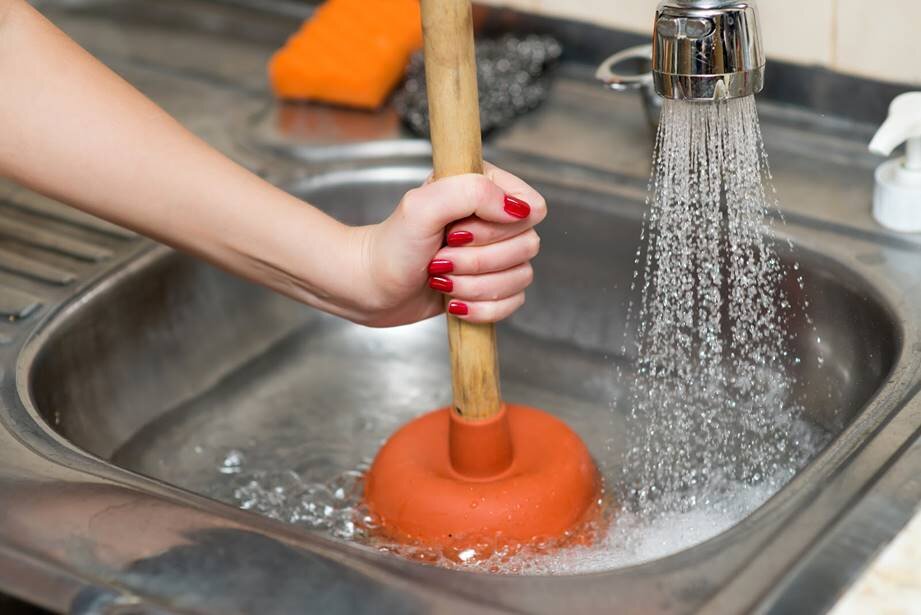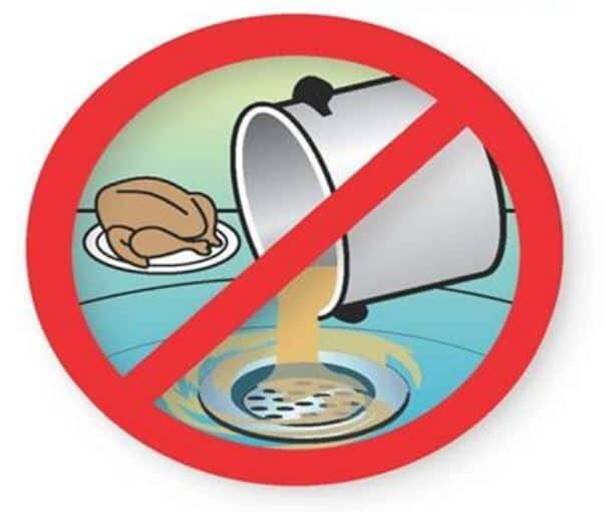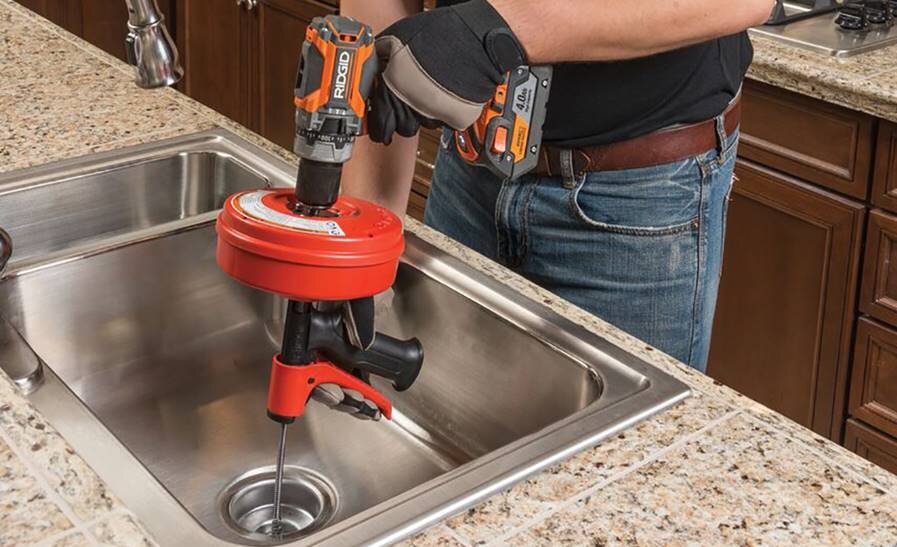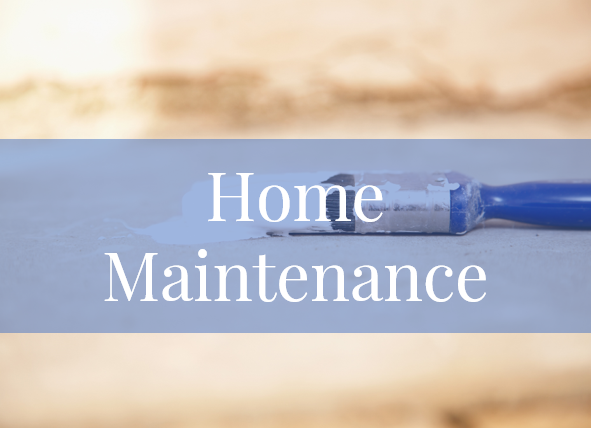Your Guide to Preventing and Clearing Clogged Drains
/Prefer to listen?
Kitchen Sinks
Kitchen sinks are the drains that get clogged most often. The best way to ensure this doesn’t happen is to avoid letting anything go down the drain other than water. I know this can be hard to do because our instinct is to pour or toss other items down the drain. Here are some ideas for how you can minimize the problem.
The #1 cause of kitchen drain clogs is grease buildup. Whenever you are cooking with bacon or oil (things that produce grease), pour the leftover grease into a jar or old metal can. You can then dispose of it in the trash, or if your community has a green bin program, the grease can go into the green bin.
In order to minimize the grease going down the drain even more, use a damp paper towel and wipe down any pots or pans after disposing of the grease and oils before placing them in the sink for washing. If you will be washing any oily or greasy dishes, put a small amount of liquid degreasing dish soap into the drain while running hot water after you’re done washing the dishes.
A word of caution about garbage disposals: we don’t encourage our clients to use them. Although they can grind up large amounts of food particles and food waste, once those items are in your drain line, they can adhere to the sides of the pipe and even accumulate to cause clogs. Even foods like corn husks, banana peels, and fibrous foods can get caught in the blades of the disposal. Some of these foods can also be gooey and gummy and will stick to the insides of the drain lines, creating a great starting point for a clog. If you do use your disposal, ensure you use cold running water when operating it.
Don’t put any other food down your drain either, especially things like coffee grounds, bones, meat, grains, or egg shells. Scrape food off your plates and dispose of leftovers in the garbage.
Use a drain grate or screen over the drain topper at the bottom of the sink to prevent non-liquid materials from entering the drain. Make sure that you always wash out the grate at least once a week, but preferably once per day.
For preventative maintenance for your kitchen drains, once a month, use degreasing dish soap in a clean sink and run hot water down the drain for a minute or so.
Every other month, fill your sink completely with hot water and then pull the plug. The water will rush down the drain and through the pipes and could dislodge any buildup that is starting to form.
Bathroom Sinks
Normal use of bathroom sinks can cause clogs if you don’t take preventative measures. Soap, personal products, and hair are the most common causes of clogs.
If you have a pop-up assembly, always have it in place so nothing goes down the drain when you’re using the sink. If you don’t have a pop-up assembly, use a drain screen, available at hardware stores, big box stores like Walmart, and even dollar stores. This will catch hair and items that might fall into the sink.
Just like your kitchen sink, once a month do some preventative maintenance by running hot water down all bathroom sink drains for 1-2 minutes. Also, every other week, pull out your drain stoppers (pop-up assembly) completely and check for buildup. There will usually be some amount of hair, soap scum, skin cells, and dirt. Clean it thoroughly by scrubbing with a toothbrush before re-inserting.
Also, just like your kitchen sink, every other month, fill your bathroom sink completely and pull the plug to dislodge any potential buildup.
Bonus tip: If one of your rings falls down the drain, STOP using the drain immediately and call a plumber. Rings can often be retrieved if they have fallen into the trap. Rings will remain there as long as water is not running and pushing them farther down the line.
Shower and Tub Drains
Shower and tub drains clog for essentially the same reasons as bathroom sink drains: hair, soap, and personal products. A drain screen is the best way to catch everything that shouldn’t be going down the drain. Another way to minimize the amount of hair going down the drain is to brush your hair before you take a shower. This reduces the 'shedding' in the shower.
Depending on the size of your family and how frequently showers are taken, running hot water down the drain for 1-2 minutes once per month up to once per week should be done. The more often your shower is used and the more people in your household who have long hair or use a lot of products in the shower, the more often this should be done.
Filling the tub with hot water just like you’re doing for the kitchen and bathroom sinks is also a good idea. Flush your tub every other month to clear any buildup.
Toilets
Toilets are designed to flush waste and toilet paper products only. Even some toilet paper can cause a clog if too much of it is used or if it is quite thick.
Nothing else, intentionally or unintentionally, should ever be flushed down the toilet, including paper towels, feminine hygiene products, kitty litter, wet wipes, dental floss, medication, or children’s toys. All of these items can cause serious clogs.
Toilet clogs can cause a lot of damage. Once you flush, it’s not easy to stop the water from flowing, and consequently, if the bowl starts to overflow, you could end up with water damage to the floor of the bathroom or even the ceiling on the floor below.
Although I’ve offered several suggestions of things you can do monthly or even weekly to prevent clogged drains, there’s nothing you can pour down the toilet to prevent clogs. The best prevention is to ensure you don’t put anything down the toilet that shouldn’t be there.
Main Sewer Drains
You’ve got a major problem on your hands when you have a main sewer drain. This requires a professional plumber to deal with it.
The main cause of sewer drains becoming clogged is tree roots. These drains run under the house and connect to all of the other drains in your home. Older homes, homes with large trees, and multi-family homes tend to be at the highest risk.
Tree roots will search for rich nutrients, and since waste is a great source for plants, they will detect moisture and, over time, work their way into the lines through small cracks. If you suspect you might have a tree root problem, call a professional.
What to Do When You Do Get a Clog
Don’t use chemical cleaners! Most of these contain acidic properties. They may de-clog your drain, but they may also corrode your pipes. When pipes begin to corrode, flecks of the piping materials will scrape away from the inner walls and travel down the pipe. These bits can get caught and form the beginnings of a clog. Corroded pipes will also spring leaks more easily. Pipe corrosion is permanent, and the only way to fix it is to replace the pipe.
Homemade Drain Cleaning Solution
This is a great homemade solution with items you probably already have at home. Try this the next time your drain seems to be running a little slow.
¼ cup baking soda
½ cup vinegar
boiling water
Remove any standing water first. Pour the baking soda down the drain. Next, pour the vinegar and allow it to fizzle for at least 10–15 minutes. If it doesn’t fizzle, get new baking soda. Then just flush out the drain with boiling water.
You can also use plungers, snakes, and augers to clear drains. Using a plunger takes some patience and practice. When using a plunger at the kitchen sink, be sure to cover the drain on the opposite side if you have a double basin. The pressure of plunging could cause water or debris to spray up the other drain.
A drain snake is a small piece of plastic that can be inserted into the drain. It has little 'teeth' on the sides to provide resistance against hair and debris that could be built up, causing the clog.
If you can’t easily clear a drain, consider calling a plumber while the issue is still manageable. A licensed plumber will have all of the tools and equipment necessary to make relatively easy work of clearing the clog. And if it is a bigger clog, he or she will be able to deal with that too.
If you've got some of your own tips or tricks for clearing a clogged drain, consider sharing them here in the comments. We always welcome new ideas on home maintenance.




























